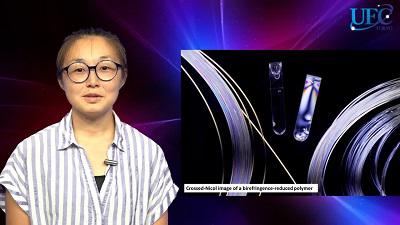December 2019 Issue
Feature
Basic studies and application of plastic optical fibers

Rei Furukawa
Associate Professor, Department of Engineering Science, The University of Electro-Communications, Tokyo.
Rei Furukawa and her colleagues are conducting research on plastic optical fibers. "We fabricate our own fibers, for example using unique monomer compositions, by adding dopants, dyes, fluorophores, nano-crystals, for example," explains Furukawa. "We are investing new possibilities of plastic-based optical fibers."
Plastics, such as water bottles, are transparent, flexible, and can tolerant greater outer forces compared to glass. Furukawa and her group research are using this elastic nature of polymers to make fiber-optic strain sensors with higher sensitivity and new detection mechanisms.
"We are developing fiber-optic strain sensors that allow the user to literally see stress using their own eyes instead of relying on equipment such as spectrum analyzers."
Furthermore, another feature is that if someone has any interesting small molecules or particles, then it is possible to just dope it into the plastic optical fiber core. "In that way, you can see the performance of your material over an optical path in the range of meters," says Furukawa.
Furukawa is collaborating with civil engineers who are close to workers on highways and chemical industries. "Sometimes they bring us new ideas for using plastic fiber that we have not thought about. We are totally open for collaboration with researchers and industrialists throughout the world."


